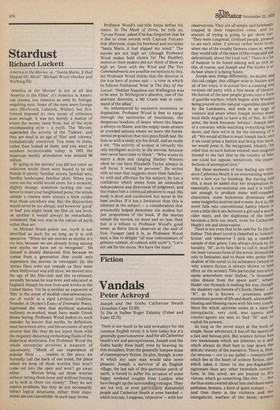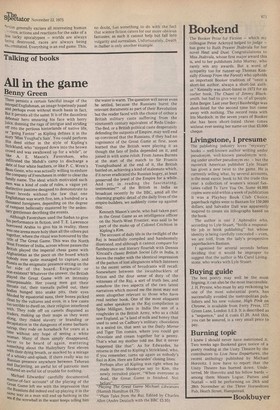Fiction
Vandals
Peter Ackroyd
Joseph and the Goths Catherine Heath (Jonathan Cape £2.95) To Die in Italbar Roger Zalazny (Faber and Faber £2.75) There is not much to be said nowadays for the common English novel; it is here today but it's generally gone tomorrow. And for all Catherine Heath's wit and perceptiveness, Joseph and the Goths hardly frees itself, even by heaving its thin shoulders, from the generally lumpen mass of contemporary fiction. Its plot, though, is one in which any sane man would take some pleasure. Joseph, a survivor of an English village, the last salt of this particular patch of earth, is forced to suffer the invasion of some happy weekend couples from London who have bought up the surrounding cottages. They are not evil, or even fiiirtict-iTarly distasteful people and Catherine Heath is even handed which is to say, I suppose, 'objective' with her observations. They are all simply and helplessly trapped in their respective roles, and no amount of trying is going to get them out: "They were congenial, civilized people, pleased to see each other, if always rather more lively when one of the nearby farmers came in, when they would talk of the state of the crops and ask deferentially about the local soil." There is a lot of humour to be found among soil as rich as this, of course, and Joseph and The Goths is at its best when it is being funny. Joseph sees things differently, no doubt, and this old codger, this villager wise in Nature and all of her ways, is in actual fact a cunning and reckless old party with a fine sense of theatre. His hatred of the new people grows into a form of guerilla warfare, which begins with Weedex being poured on the natural vegetables planted by the Londoners, and ends in an orgy of violence and arson when Joseph invites some local Hells Angels to have a bit of fun. At this point, the book becomes 'serious'; Joseph dies of a coronary while watching everything burn down, and then we're in for the meaning of It all: "We would all like to want Joseph back; and if we could press a button and bring him back, we would press it. He recognised, bleakly, his relief that no such button existed; and resigned himself to the fact that to the totality of hate one could but oppose, tentatively, the imperfections of attempted love." But these moments of true feeling are rare. since Catherine Heath is an entertaining writer with a -lure eye for humbug. But having said • this, it must be added that her imagination is, essentially, a conventional one and it is really not enough to produce some well-rounded characters, some humorous diversions and some insightful motives and events. As it is, the novel falls into conventional habits (there Is even a little illicit sex between a girl and a much older man), and the slightness of the book becomes a little too much, even for Catherine Heath's wit and observation.
There is not even that to be said for To Die in Italbar. This short novel is classified as 'science fiction' and whenever I pick up a random sample of that genre, I am always struck by its banality. 'SF', as its fans like to call it, must be the most vacuous form of the novel, interesting only to fantasists and to those who prefer the shadow of the novel to its substance (which is why science fiction is always shown to best effect on the screen). This particular narrative opens somewhere near Italbar, "a thousand miles distant from the space port", where Heide! von Hymack is making his way though the shadowy rain forests of Cleech; Heide( or "H", as he is known possesses some mysterious powers of life and death, alternatelY blasting and blessing races with his very touch. Since the whole universe exists in a state of intergalactic, very cold, war agents and counter-agents are sent to find "H" and to exploit his powers. As long as the novel stays at the level of simple, linear adventure, it has all the merits of a fast and furious plot. But science fiction has two weaknesses which are inherent to it and which always do their best to tear down the delicate tracery of the narrative. There is, first, the tenuous not to say pallid romanticism which lies at the heart of science fiction, and which takes it closer to the pre-Raphaelite nightmare than any other twentieth century form. In this novel, we are treated to H's visions, which go something like this; ". , . but the blue mists swirled about him and there were
perfumes, breezes, a kind of quiet ecstasy . • And then there is the violence and the intergalactic warfare of the book; science
eirtion generally excises all interesting human ,-rives, actions and reactions for the sake of a few tacky apocalypses — worlds are always being destroyed, races are always being ex,2rminated. Everything is an end game. This,
no doubt, has something to do with the fact that science fiction caters for our more obvious fantasies; as such it cannot help but fall into vulgarity and surrealism. Unfortunately, Death in Italbar is only another example.

































 Previous page
Previous page